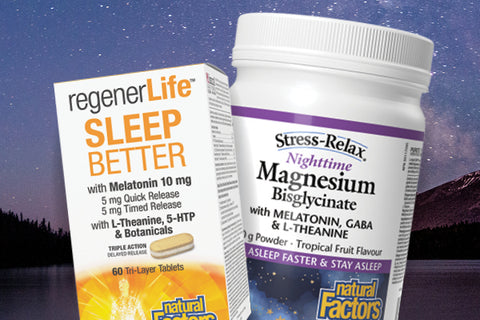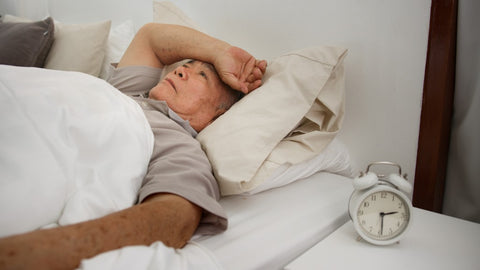How to Achieve Deep Sleep
We spend approximately 1/3 of our lives sleeping – or, for many, attempting to sleep. Optimal sleep is crucial for good health. It plays an essential role in a multitude of vital processes responsible for immunity, hormonal balance, emotional health, learning, memory, and cognition.

Sleep possesses restorative powers. Recent research confirms that toxins, via the cerebrospinal fluid, are flushed out during sleep, cleaning the brain. Without good sleep, we are at risk of short and long-term consequences. We know when we "burn the candle at both ends" and push sleep to the back burner, it is felt in various ways in the short term: poor perception and judgement, irritability, inability to focus, memory and concentration problems. "Investigators have ruled that sleep deprivation was a significant factor in the 1979 nuclear accident at Three Mile Island, as well as the 1986 nuclear meltdown at Chernobyl". (Sleep, Performance, and Public Safety, 2007, healthysleep.med.harvard.edu)
What other benefits does a good night provide?
- It plays a role in brain function by cleaning the brain's pathways, and without sleep, neurons cannot form new memories or learn.
- Sleep is required for physical and mental energy, and a lack of it can affect judgement, performance, behaviour and mood.
- During sleep, your blood pressure decreases, providing much-needed rest to your circulatory system.
- It also uses this time to repair blood vessels.
- Lack of sleep negatively affects your metabolism and can affect the part of the brain that controls hunger, causing an increase in appetite and cravings for sugar.
- Your immune system relies on sleep to keep you healthy, and without adequate amounts, you may find yourself more susceptible to colds and infections or chronic illnesses.
- Study after study has revealed that people who sleep poorly are at higher risk for several diseases and health problems.
However, there are times when we have trouble falling asleep or staying asleep. While the amount of sleep we need changes with age and varies by individual, the average adult should aim for 7 hours a night. But there are different sleep problems we experience, and knowing these subtleties, we can improve sleep hygiene and use specific supplements as adjuncts.

Awaken to Sleep Promoting Supplements
Good quality sleep is essential for optimal health and well-being, and these two great supplements support nighttime stress, relaxation and can help you achieve deep sleep!
RegenerLife™ Sleep Better- Triple-action, delayed-release sleep nutrients for relaxation and better sleep Sleep Better is part of the RegenerLife anti-aging line of supplements formulated for whole-body rejuvenation and longevity. Declining melatonin production in older age declines and can alter the body's sleep-wake cycle, affecting daytime energy, mood, and overall health. Supplemental melatonin provides a natural way for people experiencing disrupted sleep patterns to reset a normal sleep-wake cycle and promote a longer, better quality of sleep and improves sleep efficiency.
How it works
The advanced tri-layer tablets in RegenerLife™ Sleep Better release 5 mg of melatonin immediately along with other sleep-supportive ingredients to help you fall asleep faster. This is followed by a gradual release of 5 mg of melatonin to help you stay asleep longer. The melatonin in “Sleep Better” works complementarily with 5-HTP, a free-form amino acid that improves rapid eye movement (REM) sleep. REM sleep plays an important role in dreaming, memory, emotional processing, and healthy brain development.
5-HTP is a direct precursor to the neurotransmitter serotonin and is used to produce some of the body’s melatonin. Supplementation with 5-HTP has been shown to increase the amount of time spent in REM sleep. 5HTP has shown positive effects in helping people overcome insomnia.
The amino acid L-theanine works alongside a blend of sleep-supportive herbs – valerian, passionflower, and hops – to temporarily promote relaxation and calm feelings of nervousness that may be impacting sleep. L-theanine has neuroprotective properties and stimulates the production of alpha brain waves associated with a relaxed state and inhibits the activity of the excitatory neurotransmitter glutamic acid It increases brain levels of the neurotransmitters serotonin, dopamine, and gamma-aminobutyric acid (GABA) that are involved in relaxation and memory.
Valerian contains multiple active compounds, including valerenic acid and valerenol, which activate GABA receptors to reduce nervousness. Hops have sedative properties associated with the compound humulone, which influences GABA receptor activity
Passionflower extract also exerts a sleep-inducing effect by supplying a direct source of GABA and modifying GABA receptors
Reduce Nighttime Stress for a Deep Sleep with Stress-Relax Nighttime Magnesium- Stress-Relax® Nighttime Magnesium Bisglycinate with Melatonin, GABA & L-Theanine is a long name but perhaps the only way to express all the supplements combined to produce the ultimate relaxed sleep state we desire. Stress-Relax Nighttime Magnesium Bisglycinate combines magnesium bisglycinate with melatonin, L-theanine, and Pharma GABA, to temporarily promote relaxation and improve sleep quality. Together, these ingredients help the body's sleep-wake cycle, allowing you to fall asleep more quickly and sleep longer.
How it works
There is a reason why people call magnesium a relaxation mineral. This essential nutrient is needed for hundreds of biochemical processes throughout the body, including muscle contraction and relaxation. It helps support muscle function. Magnesium also plays a vital role in regulating the body's stress response. Inadequate magnesium can lead to muscle tightness, cramping, spasms, and neuromuscular irritability. Because many common forms of magnesium require stomach acid for absorption, magnesium levels can be compromised in older adults with low stomach acid, as well as in people using antacid medications. This formula contains 100% of the bisglycinate form of magnesium that is easy on the stomach and does not require stomach acid for absorption.
GABA provides a non-addictive way to improve sleep quality by calming a racing mind and helping the body relax quickly. It provides fast-acting relief for nervousness and acute stress. In a randomized, placebo-controlled study, participants with moderate sleep disorders were supplemented with 100 mg of Pharma GABA 30 minutes before bed each night for one week. GABA improved the participants' moods when they woke up in the morning. Based on electroencephalography (EEG) recordings, supplementation was also discovered to shorten participants' time to fall asleep and increase total non-REM sleep time (Non-REM sleep is a deeper sleep needed to rest both the brain and the body).
The body's sleep-wake cycle can be disrupted by shift work, jet lag, stress, artificial light, aging, and other factors, resulting in insufficient melatonin at bedtime. Melatonin is the body's natural sleep hormone, produced in the brain each evening when darkness falls and aids sleep. It works as part of a complementary cycle with serotonin, enhancing GABA receptor binding that regulates sleep-wake transitions, neuroendocrine rhythms, and body temperature cycles. Melatonin has been used for decades to address disrupted sleep schedules and sleep disorders. Some studies demonstrated that people who took up to 5 mg of melatonin fell asleep significantly faster, slept longer, and had improved sleep quality compared to those who took a placebo. Melatonin does not cause dependence and has minimal side effects
Tea drinkers have experienced the relaxing effects of L-theanine for thousands of years. L-theanine is a free-form amino acid extracted from green tea that calms the mind and temporarily encourages relaxation. It can cross the blood-brain barrier and elicit an effect as quickly as 30 minutes after supplementation. A placebo-controlled crossover study found that supplementation with 200 mg of L-theanine daily before bed improved cognitive health and sleep quality in healthy adults. After four weeks of supplementation, participants experienced fewer stress-related symptoms, fell asleep faster, had lower sleep disturbance, and reduced their need for sleep medication. Although the dose of administered L-theanine was higher than that of Nighttime Magnesium Bisglycinate, it was supplemented without other sleep-supportive ingredients.
The delicious, tropical fruit-flavoured powder is naturally sweetened with stevia and offers a flexible dose – 1–2 scoops based on your personalized Nighttime needs.

Who should consider a natural sleep supplement?
- Aging adults experiencing a decline in melatonin production
- Adults who have difficulty falling asleep or staying asleep or who wake up too early
- Individuals who want to optimize their sleep for healthy aging
- People who have trouble recovering from altered sleep schedules, such as jet lag
- Anyone with occasional insomnia or who wakes up at night
- Adults who want to actively promote longevity and healthy aging
Dietary habits and choces such as eating later into the evening can impact digestion, affecting your ability to sleep. Drinking stimulants (coffee, tea, energy drinks or alcohol) can disrupt your sleep cycle.
Many effective sleep formulas address the different stages and needs of sleep. Finding the right supplement for you involves examining your present health condition and goals, and reflecting on your sleep patterns.